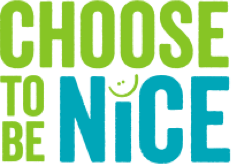
When I worked in the corporate world, I was struck by how quickly minor disagreements or even general conversations with others could spiral into bitter arguments and long-term disputes and discomfort. It made me sad to see colleagues focused on that conflict rather than the work we were supposed to be doing. I remember always feeling that if we could just act respectfully, and with more patience and kindness toward each other, we could all be happier and more successful as a team. That is part of what inspired me to start Choose To Be Nice.
Conflicts and disagreements happen not only in the workplace but in our schools, communities and even our own homes. I want to help create a stronger, more supportive environment that enables people to reach their potential. While this is partly about doing positive things such as bringing in treats or leaving a nice note on someone’s desk, it’s also about reducing the negativity and tension that leads to long-term troubles.

We can acknowledge that disagreements are inevitable. We don’t always see things the same way and we may have very different opinions, values and sets of beliefs that guide how we think things should be done. The question we have to answer is how will we respond to one another. What we say, or don’t say, can fan the flames or neutralize a situation. How we react and even our body language can determine the outcome – positive or negative – of any interaction.
Here is an important truth – it’s not a sign of weakness to stop arguing and reduce conflict but rather an indication of strength. It takes more power to disengage and de-escalate than to fuel discord.
This is not to say that you shouldn’t stand up for yourself or that you should give in just to avoid conflict. That’s not good or healthy for anyone. But you can find ways to navigate the situation in a way that gives everyone a better outcome.
Ideally, we would all be equal participants in ensuring that disagreements don’t escalate into nasty battles. But the reality is that one person may need to take the lead. It starts with a decision that you want things to be better, that you want to respond and react in a way that will turn the situation around. Basically, it starts with being aware of the choice that you have.
Here are some thoughts I have on how to steer things in a better direction:
Listen more than talk. Ask more questions than you make statements. Try to understand where the other person is coming from even if you don’t agree. Sometimes, a person just needs to know they’re being heard.
Put yourself in the other person’s shoes. Consider their position and what else is going on in their life. What is driving their action? It may be unrelated to the issue at hand.
Let small things go. Let go of having to be “right.” Yes, the sky is blue. You know it and so does everyone around except for the person in your face saying it’s not. Let them have their perspective and move on to more important issues.
Be firm when it’s important but do so with compassion and gentleness. Sometimes you will have to make hard decisions and take actions that are difficult but do so with respect and you will have a better outcome.
Think about how you want others to feel when they walk away from an interaction with you. Do you want them to feel weak, embarrassed, ashamed, worthless? Or do you want them to feel empowered, encouraged, supported, inspired, motivated, engaged?
These are skills we need to learn and practice. And, we need to teach them to our children. We need to talk with them about how they can respond in situations. We need to show them that they have options and we need to guide them in thinking through the potential results of their choices. My sincere hope is that as we talk, learn and practice, we will make a difference that will resonate and spread throughout our community, our country, and indeed, the whole world.
